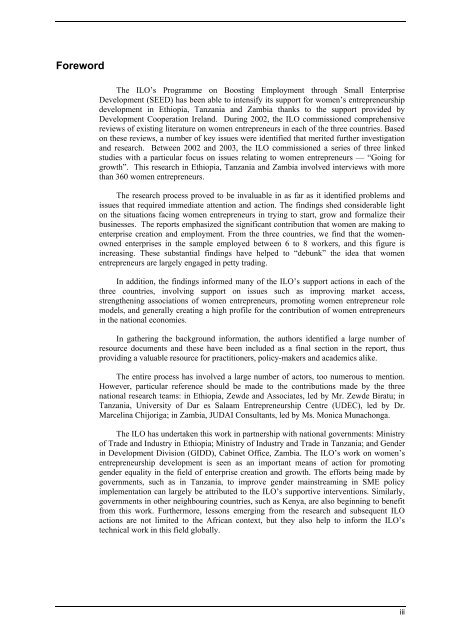The Challenges of Growing Small Businesses - International Labour ...
The Challenges of Growing Small Businesses - International Labour ...
The Challenges of Growing Small Businesses - International Labour ...
Create successful ePaper yourself
Turn your PDF publications into a flip-book with our unique Google optimized e-Paper software.
Foreword<br />
<strong>The</strong> ILO’s Programme on Boosting Employment through <strong>Small</strong> Enterprise<br />
Development (SEED) has been able to intensify its support for women’s entrepreneurship<br />
development in Ethiopia, Tanzania and Zambia thanks to the support provided by<br />
Development Cooperation Ireland. During 2002, the ILO commissioned comprehensive<br />
reviews <strong>of</strong> existing literature on women entrepreneurs in each <strong>of</strong> the three countries. Based<br />
on these reviews, a number <strong>of</strong> key issues were identified that merited further investigation<br />
and research. Between 2002 and 2003, the ILO commissioned a series <strong>of</strong> three linked<br />
studies with a particular focus on issues relating to women entrepreneurs — “Going for<br />
growth”. This research in Ethiopia, Tanzania and Zambia involved interviews with more<br />
than 360 women entrepreneurs.<br />
<strong>The</strong> research process proved to be invaluable in as far as it identified problems and<br />
issues that required immediate attention and action. <strong>The</strong> findings shed considerable light<br />
on the situations facing women entrepreneurs in trying to start, grow and formalize their<br />
businesses. <strong>The</strong> reports emphasized the significant contribution that women are making to<br />
enterprise creation and employment. From the three countries, we find that the womenowned<br />
enterprises in the sample employed between 6 to 8 workers, and this figure is<br />
increasing. <strong>The</strong>se substantial findings have helped to “debunk” the idea that women<br />
entrepreneurs are largely engaged in petty trading.<br />
In addition, the findings informed many <strong>of</strong> the ILO’s support actions in each <strong>of</strong> the<br />
three countries, involving support on issues such as improving market access,<br />
strengthening associations <strong>of</strong> women entrepreneurs, promoting women entrepreneur role<br />
models, and generally creating a high pr<strong>of</strong>ile for the contribution <strong>of</strong> women entrepreneurs<br />
in the national economies.<br />
In gathering the background information, the authors identified a large number <strong>of</strong><br />
resource documents and these have been included as a final section in the report, thus<br />
providing a valuable resource for practitioners, policy-makers and academics alike.<br />
<strong>The</strong> entire process has involved a large number <strong>of</strong> actors, too numerous to mention.<br />
However, particular reference should be made to the contributions made by the three<br />
national research teams: in Ethiopia, Zewde and Associates, led by Mr. Zewde Biratu; in<br />
Tanzania, University <strong>of</strong> Dar es Salaam Entrepreneurship Centre (UDEC), led by Dr.<br />
Marcelina Chijoriga; in Zambia, JUDAI Consultants, led by Ms. Monica Munachonga.<br />
<strong>The</strong> ILO has undertaken this work in partnership with national governments: Ministry<br />
<strong>of</strong> Trade and Industry in Ethiopia; Ministry <strong>of</strong> Industry and Trade in Tanzania; and Gender<br />
in Development Division (GIDD), Cabinet Office, Zambia. <strong>The</strong> ILO’s work on women’s<br />
entrepreneurship development is seen as an important means <strong>of</strong> action for promoting<br />
gender equality in the field <strong>of</strong> enterprise creation and growth. <strong>The</strong> efforts being made by<br />
governments, such as in Tanzania, to improve gender mainstreaming in SME policy<br />
implementation can largely be attributed to the ILO’s supportive interventions. Similarly,<br />
governments in other neighbouring countries, such as Kenya, are also beginning to benefit<br />
from this work. Furthermore, lessons emerging from the research and subsequent ILO<br />
actions are not limited to the African context, but they also help to inform the ILO’s<br />
technical work in this field globally.<br />
iii
















